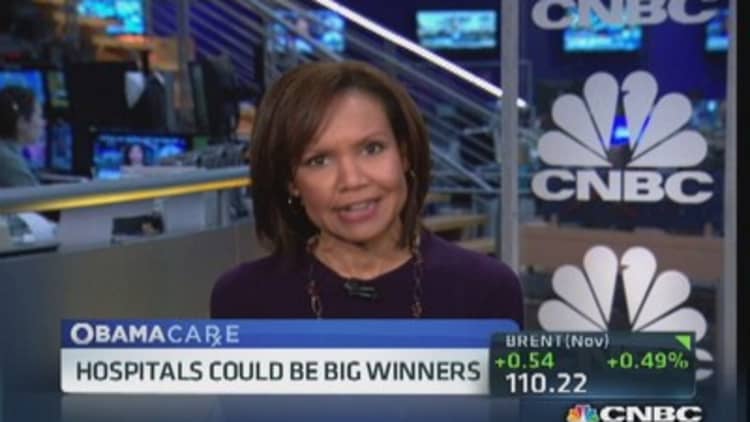
Having more patients insured under Obamacare could be a game changer for hospitals, especially those with major emergency departments, such as Universal Health Service's George Washington University Hospital in the nation's capital.
U.S. hospitals provided more than $41 billion in uncompensated care in 2011, according to the most recent data available from the American Hospital Association. On average, the cost of that bad debt has risen 8 percent annually since 2006.
"The industry in acute care runs between 12 and 20 percent bad debt," said Alan Miller, founder and CEO of Universal Health Services. "As you know, people that present themselves in emergency rooms must be treated, and so many of these people have no coverage."
That trend could change dramatically, with 7 million people expected to gain coverage through the government health exchanges, and millions more in the states participating in Medicaid expansion.
Read more: John Stewart roasts Obamacare boss Sebelius)
For Universal Health, which operates nearly 200 behavioral health facilities, the new mandate that mental health coverage be included in plans could also be a positive catalyst. In the past, policies for individuals and small businesses did not have to provide mental coverage, said Miller, speaking from his firm's Horsham Clinic for behavioral health in Ambler, Pa.
Greater access to treatment could make a big difference for the families of young people with mental health issues, according to Miller.
"Very often, symptoms show up in youngsters, and if you have an ability to pay or to be treated when you are young, teenagers, it's very meaningful in terms of their ultimate cure," he said.
The Affordable Care Act also puts pressure on hospitals in terms of government payments. New Medicare rules have tied reimbursement rates to performance and patient outcomes. The sequester has also resulted in cuts for hospitals.
But analysts say millions of newly insured patients should help offset those pressures.
"We think there's about $3.5 billion of incremental revenue opportunity through the health-care reform that should benefit the sector," said analyst Darren Lehrich of Deutsche Bank Securities.
"When you take that revenue and you offset it against some of the Medicare cuts and other things that come down the line, you get a very beneficial margin bump in the industry's profitability," he said.
(Read more: Slow-bamacare: Tech fixes planned for exchanges)
Shares of hospital operators have outperformed the overall market already this year. Tenet Healthcare is up more than 40 percent, and Universal Health Services and HCA Holdings are both up more than 50 percent. Analysts at Goldman Sachs raised their rating on the hospital sector, saying investors still have not priced in Obamacare expansion.
"While investors see health-care reform as a net positive for the hospitals, we believe they continue to underestimate the magnitude of the impact insurance coverage will have on payer mix," the analysts wrote in a client note.
Analyst Sheryl Skolnick of CRT Capital Group said that even the prospect of lower Medicaid and insurance reimbursement rates is better than trying to collect from the uninsured.
"You have to see patients come, instead of being no-pay patients, who maybe pay 8 cents on the dollar at best, become full-paid patients even at very low Medicaid rates," she said.
Hospitals know it all too well, and Miller of Universal Health said that the staffs at his facilities will be proactive about helping uninsured patients learn about their eligibility for coverage under the Affordable Care Act.
"People look to us for help and education about the health-care system—they have forever," Miller said.
—By Bertha Coombs. Follow her on Twitter: @coombscnbc.


